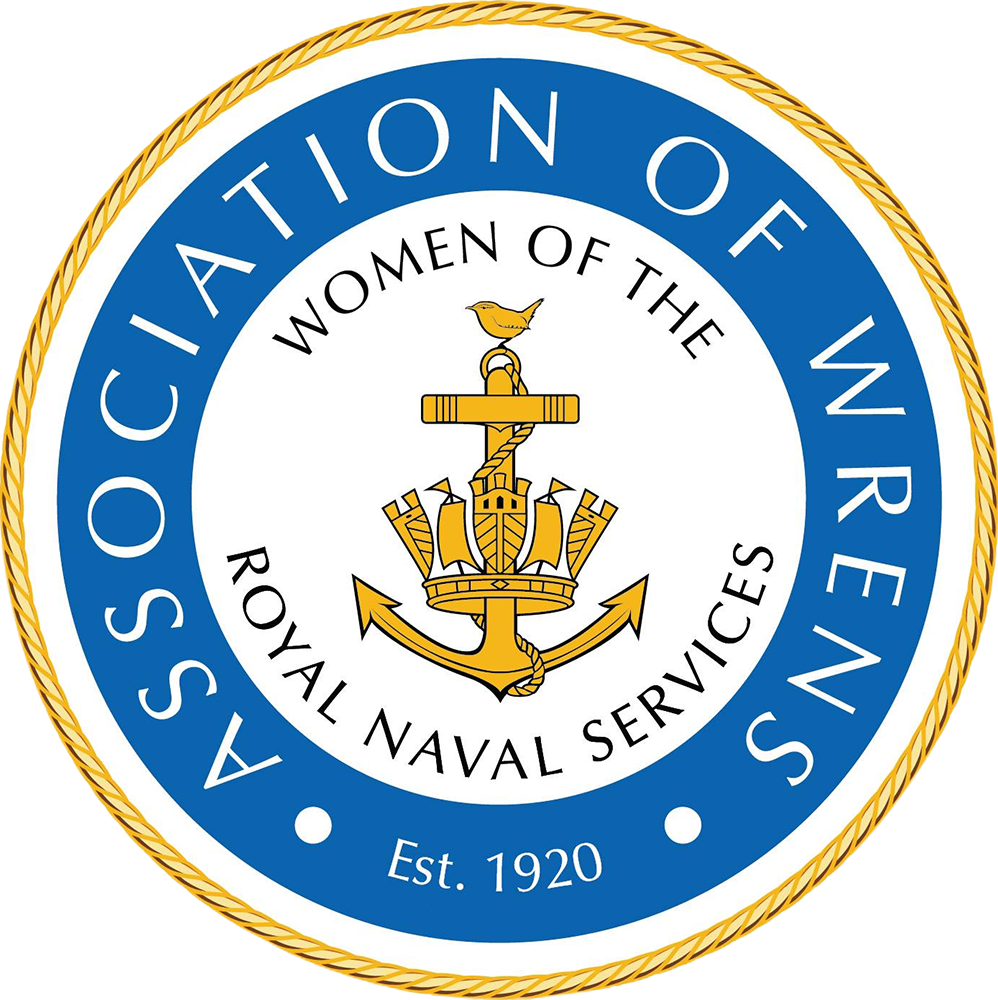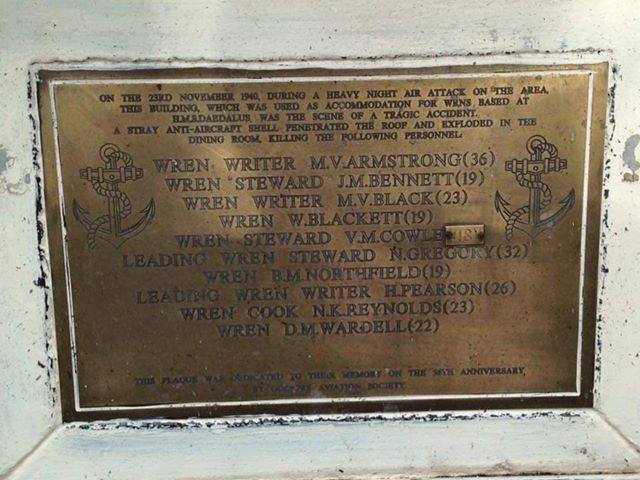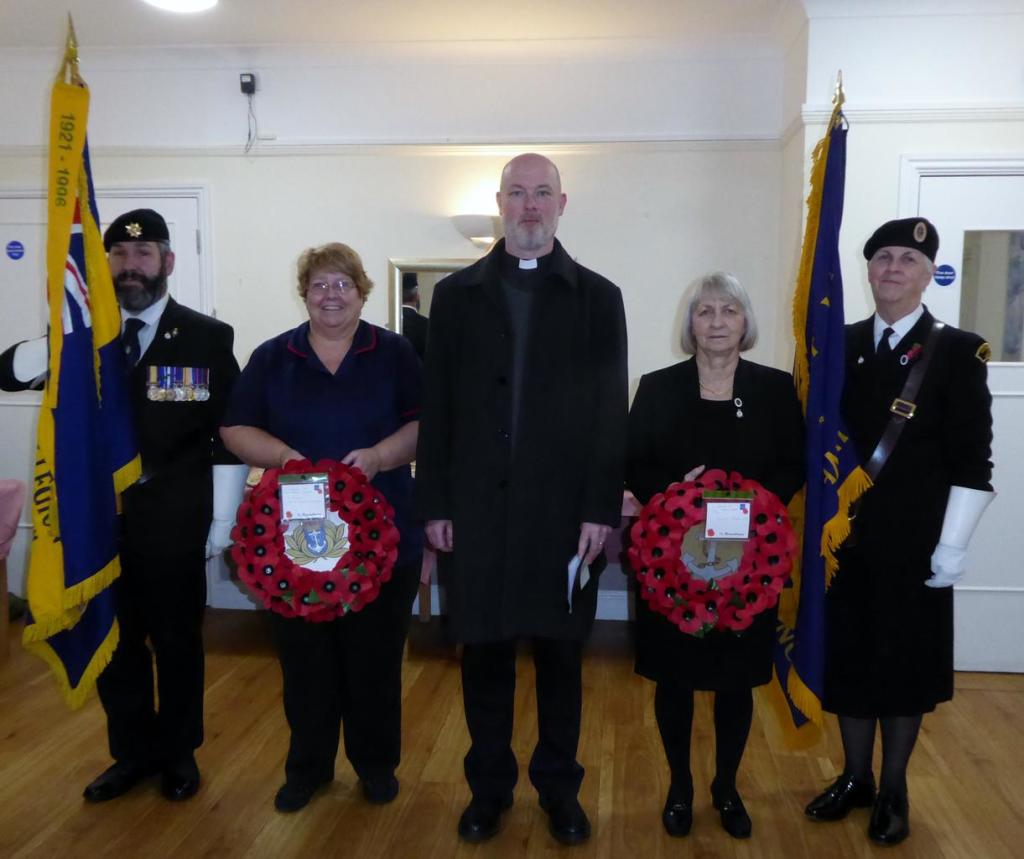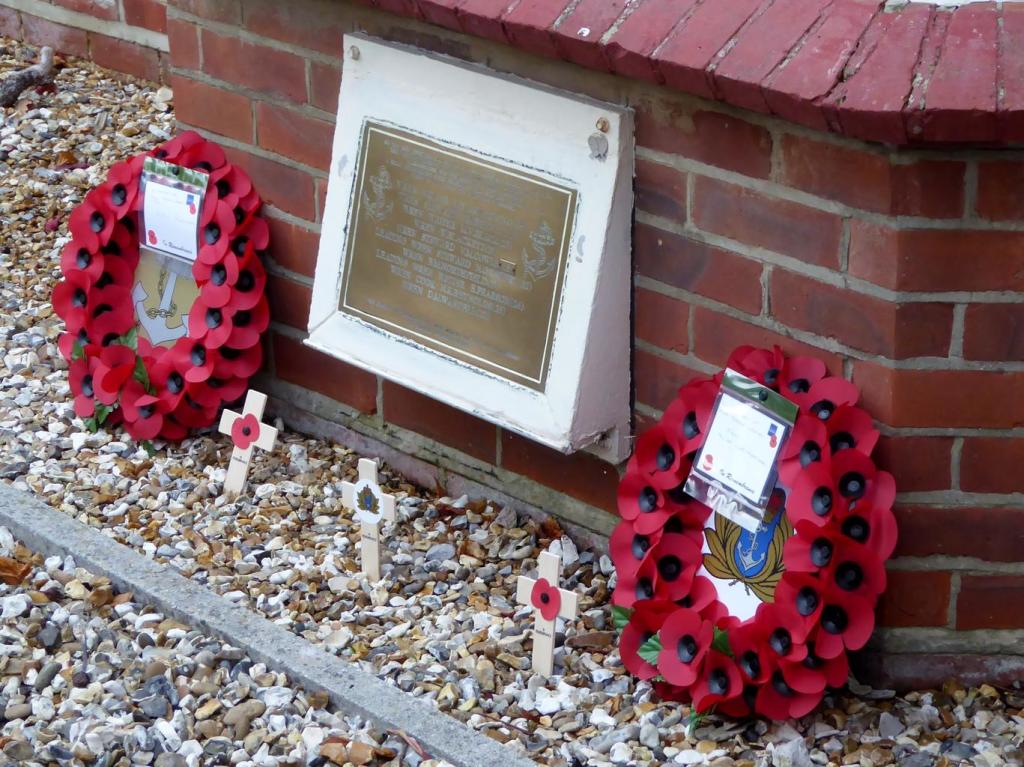Ten Wrens lost in air-attack Nov 1940

On 23rd November 1940, German airplanes attacked the South Coast. 24 Wrens had gathered for dinner in the dining room of Mansfield Hostel, Lee on Solent (HMS Daedalus) when an anti-aircraft shell hit the dining room directly and exploded.
At a very moving memorial service on 23rd November 2018, conducted by the local Vicar Paul Chamberlain at Glen Heathers (the site of WWII Wrens Quarters) in Lee-On-Solent, Val Gleave carried the Portsmouth Branch standard, accompanied by Portsmouth Chairman Jan Vanson and three Veteran Wrens. The RBL and AOW Portsmouth Branch standards were lowered in memory of the 10 Wrens who lost their lives and wreaths laid at the plaque naming the following Wrens who lost their lives:
Wren Rosa Armstrong (36)
Wren Joyce Bennett (19)
Wren Mona Black (23)
Wren Winnie Blackett (19)
Wren Vera Cowle (18)
LWren Nellie Gregory (32)
Wren Beryl Northfield (19)
LWren Hilda Pearson (26)
Wren Nora Reynolds (23)
Wren Dorothy Wardell (22)
Eight of the Wrens were laid to rest in Haslar Royal Naval Cemetary. A plaque remains today on the site of Mansfield Hostel, (now Glen Heathers, a Care home) donated by the Gosport Aviation Society in 1996, now Glen Heathers a care home..
Rest in Peace Jenny
(Thanks to Jan Vanson (Chair Portsmouth AOW) and Ross Nicoll (RBL Gosport) for the images)
***********************
The Wren magazine October 2008
A survivor’s story told by a family member to the Association;s PRO.
In the Spring of 1941 my late sister P. was just twenty years old. Her burning ambition at that time was to walk to the end of our Crescent, to meet me as I came home to dinner from the High School and walk with me back to the house. Simple enough one might think; an ambition easy to achieve – unless of course you are incapable of walking more than a few tottering steps.
Scene change to HMS DAEDALUS 1940. Wren Writer P,H, having completed a secretarial course in Swansea went on her first draft to Lee-on-Solent, joining twentythree other Wrens who were accommodated in Mansfield Hostel, (WRNS Qrtrs). On 23 November 1940, in Swansea her mother seemed edgy and apprehensive all day and did not seem to enjoy the simple celebrations for her birthday. In the evening at about 8 o’clock the phone rang. It was the Naval Hospital Haslar asking her to get to Portsmouth as quickly as she could – her daughter P. had been badly injured and there were fears for her life.
The reason was then discovered – an hour before that call, at Mansfield Hostel, the Wrens had gathered round the table for their supper. They had just started to serve out some rice pudding when an anti-aircraft shell landed in the middle of the table. It had failed to explode in the air but did so with great force when it landed, killing ten of the Wrens out-right and injuring thirteen, P..s injuries being the most serious. She had a bad habit of tilting her chair onto its back legs when at the table at home and this habit had saved her life. The blast blew her backwards; instead of her head and face, the shrapnel entered her thighs and abdomen damaging a nerve and producing a gaping wound in her right thigh. She was rushed to hospital where rapid blood transfusions saved her life. After several months in hospital, where amputation of her leg was seriously considered, she was well enough to be sent back to Swansea on extended sick leave.
There, pale and thin and in considerable pain she began to exercise her damaged legs, then to stand and take a few steps. After some weeks she managed the front path to the gate and eventually ventured out onto the pavement. She would start out to meet her sister long before her dinner hour and as the weeks passed she met up with her further and further away from home. She persisted with her exercises and walks throughout the summer holidays and at the start of the autumn term she was pronounced fit for duty. P. returned to the Wrens becoming a Petty Officer then finally leaving in 1947, to marry a former member of the Fleet Air Arm in 1947. She subsequently produced two lovely daughters in spite of her injuries.
Moving forward to 1996, a local historian whilst walking in the Haslar Naval cemetery noticed the graves of the ten Wrens, who had been in the Hostel on that fateful day in 1940. With the support of Gosport Aviation Society he was instrumental in commissioning a brass plaque listing the names, category and ages of those who had died. On the 50th anniversary of that event, the plaque was unveiled by survivor P. two of the survivors, there she met (consciously) for the first time, the man who had dragged her from the rubble and carried her to an ambulance.
Ends
Association of Wrens
Association of Wrens and the
Women of the Royal Naval Services
Bldg 1/87 Scott Road
HM Naval Base
Portsmouth, PO1 3LU
Registered Charity No. 257040
Support Us
You can help support the work of the Association of Wrens by making a donation.
Basket
© Copyright 2021 Association of Wrens - Privacy Policy Website developed by Foster & Scott









